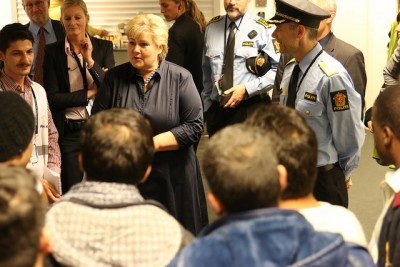Prime Minister Erna Solberg confirmed on Friday that her government wants to use NOK 4.2 billion from its foreign aid budget to help meet the huge and ever-escalating costs of refugees who’ve made their way to Norway. The proposal is meeting immediate opposition from one of the government’s support parties in Parliament, the Christian Democrats, but other parties may go along.

Solberg and Finance Minister Siv Jensen outlined their plan early Friday afternoon for financing the costs of the refugee crisis, which also threatens to pose a crisis for the government itself. With an estimated 25,000 refugees arriving in Norway this year, and another 33,000 next year, Solberg and Jensen had to tackle the unexpected influx that, as Jensen said, “creates practical and economic challenges.” She and Solberg offered first and foremost a short-term plan for this year and next, and put forward “the foundation for policies that are sustainable in the long-run for a situation with large streams of refugees.”
The government needs NOK 9.5 billion (USD 1.1 billion) immediately to pay for ongoing costs of accommodating refugees arriving now and next year. Jensen and Solberg propose spending an additional NOK 1.2 billion in oil revenues, reducing earlier proposed tax relief measures by NOK 1.8 billion and cutting NOK 2.3 billion from various ministries across the board. While Jensen stressed that the government will still put priority on transport projects and other priority programs, no ministry has been spared cuts to help fund the refugee crisis.
Tapping foreign aid funds
The most controversial part of the refugee funding package is the government’s proposal that NOK 4.2 billion be transferred from the foreign aid budget. That’s money earmarked for humanitarian and development projects abroad, including refugee relief measures in places like Jordan and Lebanon, but Solberg and Jensen reason that thousands of refugees are now in Norway instead of in the camps earmarked earlier. They point out that Norway would still be left with a generous foreign aid budget of NOK 34.8 billion for 2016, amounting to more than 1 percent of Norway’s collective tax revenues.
Knut Arild Hareide of the Christian Democrats, however, has already voiced objections to any cut in the foreign aid budget. “Foreign aid is meant to help people in need outside Norway,” he claims. “Helping people in Norway is not foreign aid. To cut the foreign aid budget, given the situation that the world and Europe is now in, is not right. It can mean that regimes that are stable today can become unstable.”
The Christian Democrats instead propose raising the revenues needed for refugees in Norway by reversing the government’s proposed budget cuts in the fortune tax, raising taxes for Norwegians on things like fuel, diesel, tobacco and alcohol, and postponing a proposed hike in pension payments to married couples. The government’s other so-called “support party,” the Liberals, will present its proposals on Monday.
Tougher budget battle looms
The proposals laid out by the Christian Democrats constitute anything but support for the government and instead strike at the heart of Jensen’s Progress Party. A much tougher state budget battle thus looms, dashing prospects for a more conciliatory tone this year and posing yet another challenge to Solberg and her Conservatives as they try to keep the minority government coalition together.
Both the opposition Labour and the Center Party, however, have urged a broad compromise in Parliament and solidarity on the refugee issue. In a twist of irony, they may wind up supporting the government instead of the support parties, but that would still leave the two government parties on shakey ground.
And then comes debate over all the other aspects of Solberg’s and Jensen’s proposals for handling the refugee issue. They include cutting refugee costs by, for example, reducing benefits for refugees living in asylum centers and lowering accommodation standards. The government also favours granting only temporary residence permits to refugees granted asylum, allowing for their return if conditions in their home countries improve.
newsinenglish.no/Nina Berglund

